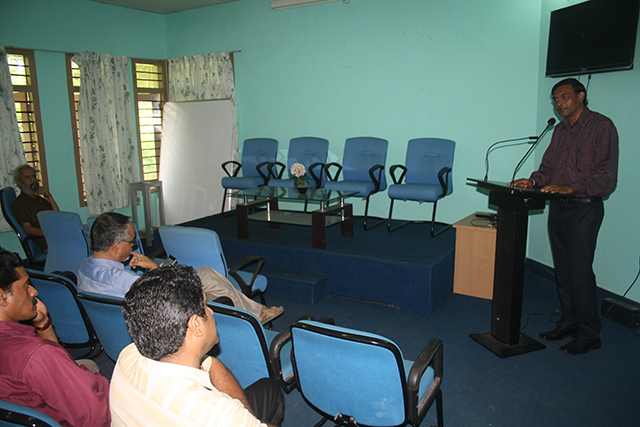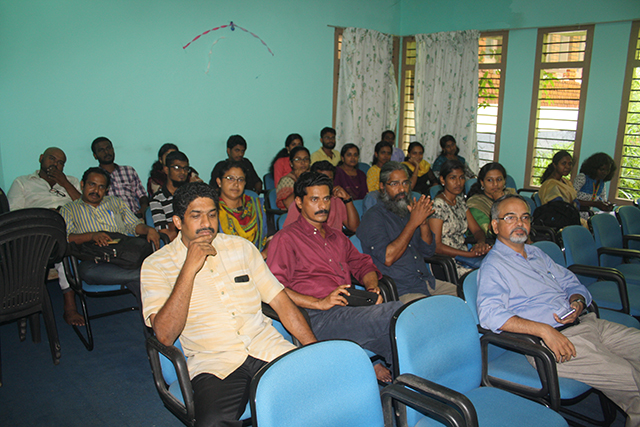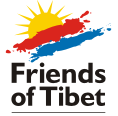"Post-Conflict Reconciliation Action as a Social Worker"
Dr Ravindra Ranasinha, Drama-Therapist and Sociologist from Sri Lanka speaks on 'Post-Conflict Reconciliation Action as A Social Worker' at the School of Letters, MG University, Kottayam, Kerala on August 14, 2017.
⋯
Kottayam, Kerala: This was the third talk of the India Lecture Series by Dr Ravindra Ranasinha, the renowned Social Activist, Educationist and Reformer from Sri Lanka. Dr KM Krishnan, Professor of English, welcomed the gathering and Dr VC Harris, Director, School of Letters, MG University, Kottayam, Kerala proposed the vote of thanks. Although the talk was held in an informal manner, there were fruitful discussions which involved Dr Biju Lal, Asst Professor in Politics, School of International Relations and Politics and a number of students participating actively in the discussions.
Dr Ranasinha spoke in detail about the civil war and how it affected not only the Tamils, but all Sinhalese communities. He called the civil war an open wound which needed cleansing in order to heal. Both parties were affected by the wound and one needed to find ways applicable for both to solve the problem. He defined the role of the social worker as a wound healer who is able to get to the crux of the problem like a doctor, to operate and remove every trace of it.
For a generation traumatized by 26 years of war, no ordinary balm will do. It requires long term intensive therapy. But Sri Lanka is in a hurry to heal and move on. It has to regain lost ground as the rest of the world progressed economically and technologically while it was embroiled in war. This is the situation confronting social workers like Dr Ranasinha as they go about providing the healing touch to the affected people. They have to find ways and means to do their work effectively and quickly. It is in this context that Dr Ranasinha employs techniques sourced from literature and art. Dramas, short stories and poetry are used as balms for treating wounds. They help a person to introspect. By finding similarities in their stories and the stories in literature and drama, people feel like they are not alone in their suffering. Dr Ranasinha uses Drama-Therapy and Psychotherapy to heal the individuals suffering from Post-War Trauma.
Describing the damage caused by war, Dr Ranasinha mentioned how people's psyche's have splintered into several fractions. They cannot come to terms with who they have become and they do not remember who they were before the war. They find it difficult to become whole again as there is a conflict in their mind. Even as the war outside has stopped the war inside their mind rages on. They have lost their identity and culture — this Dr Ranasinha believes is the worst damage. When people lose their identity they feel rootless. Several communities have lost their literature and historical records too, so they cannot even go back and read about who they were as a people. He talked about how the loss and erosion of culture was not gradual but carried out by force. Uprooting people from their culture is what is sought by war and it's the most disastrous aspects of war and conflict.
He has a difficult task as he goes about providing a healing touch to the communities ravaged by war, dealing with Post-War Trauma. Social workers and NGO's in Sri Lanka are using all tools available to them to help people deal with this trauma. Dr Ranasinha is a pioneer in using Drama Therapy to heal the effects of war in Sri Lanka. He has published many articles and books on the subject.
Dr Ravindra's thinking is highly influenced by the Frankfurt School, and especially by the writings of Walter Benjamin. His special interest on Neo-Marxism is reflected through his Sinhala translations of Walter Benjamin's lectures 'Author as Producer' and 'Art in the Age of Mechanical Reproduction'. As a veteran in the field of drama has done in-depth research towards drama's therapeutic strength to heal the psychologically and emotionally wounded people. His research study enabled him to introduce drama-therapy to Sri Lanka as a viable creative healing process. His book 'Dramatherapy in Sri Lanka' elaborates this amazing strength of drama to promote psychological, emotional and social well-being. Dr Ravindra holds a PhD in Dramatherapy.
Dr Ravindra has recently published a book on the lacunas in the Sri Lankan educational system — which he marks with a Grade F. In this new book, 'How Schools Abuse and Fail Children: Dramatherapy to Heal Emotionally Traumatized School Children in Sri Lanka', every aspect from physical to sexual and emotional abuse, to romantic adolescent crushes and suicides, mental health, home violence and broken families are dealt with comprehensively. This book is well compiled with arduous research and fortified with several case studies that clearly sound out the dangerous psychological perspectives
of such enforced trauma.
Friends of Tibet, PO Box 16674, Mumbai 400050, India.
Talk by Dr Ravindra Ranasinha
(Report by: Bina Nayak | Photos: Prof Appu John)


Friends of Tibet in association with the Mahatma Gandhi University organised 'Post-Conflict Reconciliation Action as A Social Worker' talk by Dr Ravindra Ranasinha at the School of Letters, MG University, Kottayam, Kerala on August 14, 2017.
⋯
Dr Ravindra Ranasinha is a dramatist, journalist, sociologist, educationist and a social worker from Sri Lanka. He writes profusely on the Fascist developments in his country. He focuses on the devastating Fascist attacks against the multi-religious and multi-ethnic social structure in Sri Lanka. His several essays clearly indicate how the media is responsible for shaping the mind-set of the people in the current Sri Lankan political scenario.
![]()
Email: freedom@friendsoftibet.org Web: www.friendsoftibet.org
